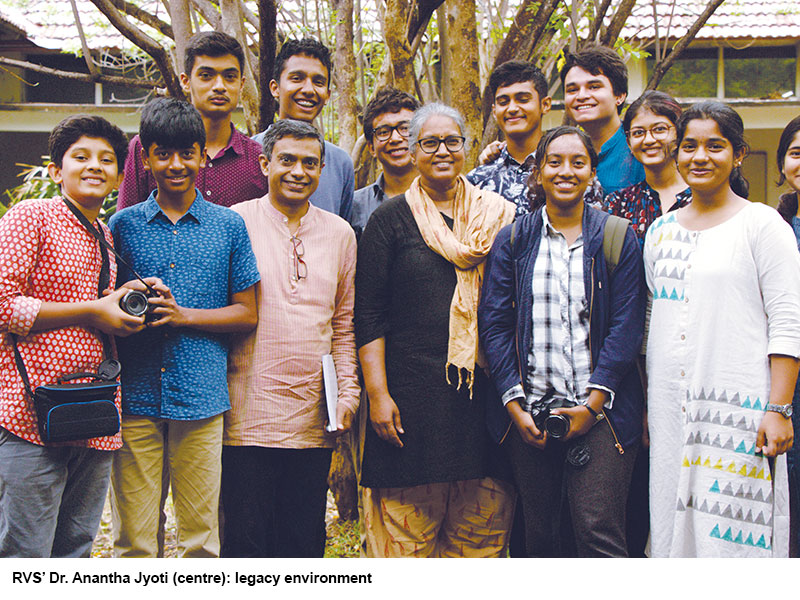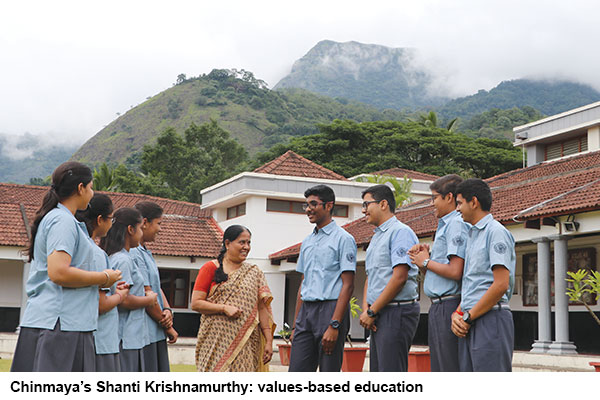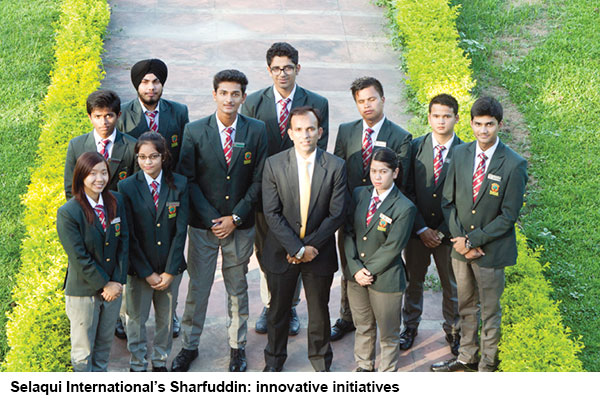It’s an indicator of the mindset change in favour of new genre, culturally rooted co-ed boarding schools that upper middle SEC ‘A’ sample respondents have voted vegetarian fare guruji institutions the Top 3 countrywide.

Although post-independence India’s K-12 education system — especially the country’s 1.20 million government schools — has been run into the ground, fortunately, despite the imposition of rigorous licence-permit-quota rules and regulations upon them by the education-agnostic neta-babu brotherhood, a substantial number of the country’s 320,000 private independent (aka unaided) schools have survived as islands of excellence in a sea of mediocrity. This is especially true of the few hundred legacy boarding schools established during the pre-independence British raj era, among the few positive outcomes of almost two centuries of ruthlessly exploitative imperial rule over the Indian subcontinent which mercifully ended in 1947.
Sited in the country’s salubrious hill stations built for the progeny of British administrators and army officials, and modelled upon England’s famous public (i.e, private, exclusive) boarding schools, these institutions — some of them established over 150 years ago — have not only survived, but also improved with the introduction of new pedagogies, indigenous cultural refinements and modern infrastructure. As such, they have made a great and largely unsung contribution to the development of post-independence India’s middle class which is leading the national development effort to close the gap between India and the developed industrial nations of the West.
Although the country’s legacy boarding schools are routinely disparaged as islands of privilege by trendy lefties and jholawalas who despite the implosion of communism and rejection of socialism worldwide continue to dominate the public discourse in contemporary India, ab initio since EducationWorld was launched two decades ago, your editors have always regarded them highly as institutions worthy of support and replication. Therefore, in the pioneer annual EducationWorld India School Rankings introduced in 2007 — which has since evolved into the world’s largest and most comprehensive primary-secondary schools evaluation survey — a special section has been reserved for rating and ranking the country’s vintage co-ed, boys and girls boarding schools separately, to eliminate apples and oranges type comparisons. And surely, it’s a mark of progress that of the country’s boarding schools sufficiently well-known to merit inclusion in the EW league tables, the largest cohort is of co-ed boarding schools.
It’s also undoubtedly a marker of the degree to which educators, principals, teachers, fees-paying parents and senior school students have revised their colonial mind-sets that for the past seven years since the annual EWISR league tables were refined to rank day, boarding and international schools separately and these broad categories were further sub-divided into co-ed, boys and girls and day-cum-boarding, that the Rishi Valley School, Chittoor (Andhra Pradesh) has been consistently ranked India’s #1 co-ed boarding school. Conceptualised and established by indigenous, pioneer environmentalist, philosopher and educationist J. Krishnamurti (1895-1986), the 12,213 sample respondents polled have voted RVS (estb.1926) #1 by a wide margin, this year as well.
Dr. Anantha Jyoti, principal of this class IV-XII CISCE-affiliated co-ed school which has 371 students mentored by 63 teachers on its muster rolls, attributes the continuous high recognition awarded to RVS by EW’s SEC (socio-economic category) A sample respondents, to the visionary culture endowed upon the school by J. Krishnamurti. “RVS is sited in a drought-prone area but it is like an oasis in the middle of barrenness. Many people who visit the school for the first time comment on the serenity and invigorating energy they experience on our campus. Even after you have lived here for more than 25 years, you are likely to feel the same freshness and surge of energy. This environment is a legacy we have inherited from Krishnamurti’s vision and the community that has nourished it through generations. Education in RVS is not just about academics. We encourage discussions about beauty, conflict, freedom and ‘living’. Institutionally, we have faced many challenges but we seem to gain sustenance through our relationships with each other and our environment,” says Dr. Jyoti explaining the RVS mystique. An English and linguistics alumna of IIT-Madras who taught English in the UK for several years before signing up as a teacher at RVS in 1996, Jyoti was promoted to the office of principal last year.
 It’s also an indicator of the attitudinal change in favour of new genre and culturally rooted co-ed boarding schools within the upper middle SEC A sample respondents of EWISR 2019-20 that Jain International, Bangalore (estb.1999) and Chinmaya International, Coimbatore (1996) — both vegetarian fare guruji institutions — are jointly ranked #2 in this year’s co-ed boarding schools national league table. “The entire CIRS community of 102 schools worldwide is elated that CIRS, Coimbatore is promoted from #4 in 2018-19 to #2 this year by your sample respondents across India. The school has steadily progressed on all fronts — academics, co-curricular and sports education — during the past decade. This is due to the complete support given to our teachers and students by the management which has inspired us to take CIRS — whose distinguishing feature is our united focus on values-based education — forward and higher. We are greatly encouraged that society appreciates and endorses our founder Swami Chinmayananda’s vision and objectives,” says Dr. Shanti Krishnamurthy, a mathematics and education postgrad of Madras and Annamalai universities with over 35 years of teaching and administration experience in the Chinmaya Vidyalaya, Jamshedpur, M.C.M. Chidambaram Chettiyar Group of Schools, Chennai and founder-principal of the Mahindra World School, Chennai (2006-2009), and incumbent director of CIRS.
It’s also an indicator of the attitudinal change in favour of new genre and culturally rooted co-ed boarding schools within the upper middle SEC A sample respondents of EWISR 2019-20 that Jain International, Bangalore (estb.1999) and Chinmaya International, Coimbatore (1996) — both vegetarian fare guruji institutions — are jointly ranked #2 in this year’s co-ed boarding schools national league table. “The entire CIRS community of 102 schools worldwide is elated that CIRS, Coimbatore is promoted from #4 in 2018-19 to #2 this year by your sample respondents across India. The school has steadily progressed on all fronts — academics, co-curricular and sports education — during the past decade. This is due to the complete support given to our teachers and students by the management which has inspired us to take CIRS — whose distinguishing feature is our united focus on values-based education — forward and higher. We are greatly encouraged that society appreciates and endorses our founder Swami Chinmayananda’s vision and objectives,” says Dr. Shanti Krishnamurthy, a mathematics and education postgrad of Madras and Annamalai universities with over 35 years of teaching and administration experience in the Chinmaya Vidyalaya, Jamshedpur, M.C.M. Chidambaram Chettiyar Group of Schools, Chennai and founder-principal of the Mahindra World School, Chennai (2006-2009), and incumbent director of CIRS.
 The 2019-20 high table seating order includes the conventional Lawrence School, Sanawar, ranked #3 (#2 last year), Assam Valley, Balipara at #4 (3), Pinegrove School, Dharampur ranked #5 (5) jointly with the previously unranked Isha Home School, Coimbatore (promoted in 2005 by popular lifestyle guru Jaggi Vasudev). And the Top 10 table is completed by Sherwood College, Nainital ranked #6 (5), Miles Bronson, Guwahati at #7 (7), the Krishnamurti Foundation-promoted Sahyadri School, Pune co-ranked #7 (9), SelaQui International, Dehradun #8 (11), Rajghat Besant, Varanasi #8 (6), Punjab Public School, Nabha #9 (8) and the Kasiga, Dehradun at #10 (8).
The 2019-20 high table seating order includes the conventional Lawrence School, Sanawar, ranked #3 (#2 last year), Assam Valley, Balipara at #4 (3), Pinegrove School, Dharampur ranked #5 (5) jointly with the previously unranked Isha Home School, Coimbatore (promoted in 2005 by popular lifestyle guru Jaggi Vasudev). And the Top 10 table is completed by Sherwood College, Nainital ranked #6 (5), Miles Bronson, Guwahati at #7 (7), the Krishnamurti Foundation-promoted Sahyadri School, Pune co-ranked #7 (9), SelaQui International, Dehradun #8 (11), Rajghat Besant, Varanasi #8 (6), Punjab Public School, Nabha #9 (8) and the Kasiga, Dehradun at #10 (8).
“We are encouraged that innovative initiatives that we have undertaken in teacher recruitment, teacher training and development and intensive usage of digital technologies which has resulted in excellent board exam results this year, is being recognised by well-informed stakeholders in K-12 education. It’s not so well-known that SelaQui International was the first school to introduce new digital technologies in secondary education in the new millennium. Since then, we have always been in the vanguard of K-12 education innovations. For instance, there is a strong emphasis in SelaQui on teaching students the 6 ‘Cs’ — collaboration, character development, creativity, critical thinking, communication and citizenship. Our board exam results are better than any of our peer schools because we teach way beyond prescribed syllabuses,” says Rashid Sharfuddin, a history and education postgrad alum of St. Stephen’s College, Delhi and the University of Bath (UK) and former housemaster at the Doon School, Dehradun, who was appointed headmaster of SelaQui in 2014. Sited on a 52-acre clean green campus which provides students a wide range of sports options, SelaQui has 318 students mentored by 48 teachers on its muster rolls.
Further down the 60-strong league table of the country’s most admired co-ed boarding schools, most schools have ceded one-three ranks. Exceptions are Peevees Public School, Mallapuram (Kerala) ranked #17 (19), the previously unranked Laidlaw Memorial School, Ketti Valley (Tamil Nadu) ranked #27, the previously unranked Kaziranga English Academy, Guwahati at #36 and St. Peter’s Residential, Hyderabad, #39 (41).
However, it’s pertinent to bear in mind that schools ranked modestly in the national league table can be top-ranked in their states. And in sub-continental India, the larger states of the Indian Union are more populous than most European countries. For instance, although The Sagar School, Alwar is ranked a modest #14 nationally, it’s the top-ranked co-ed boarding school in Rajasthan (pop. 68 million) and Himali Boarding School, Kurseong, ranked #15 all-India, is the #1 co-ed boarding school of West Bengal (pop. 91 million).


























